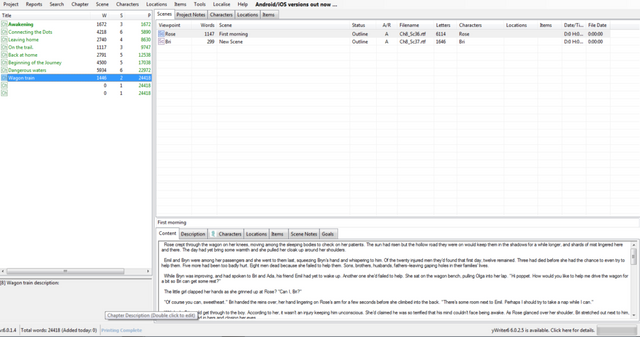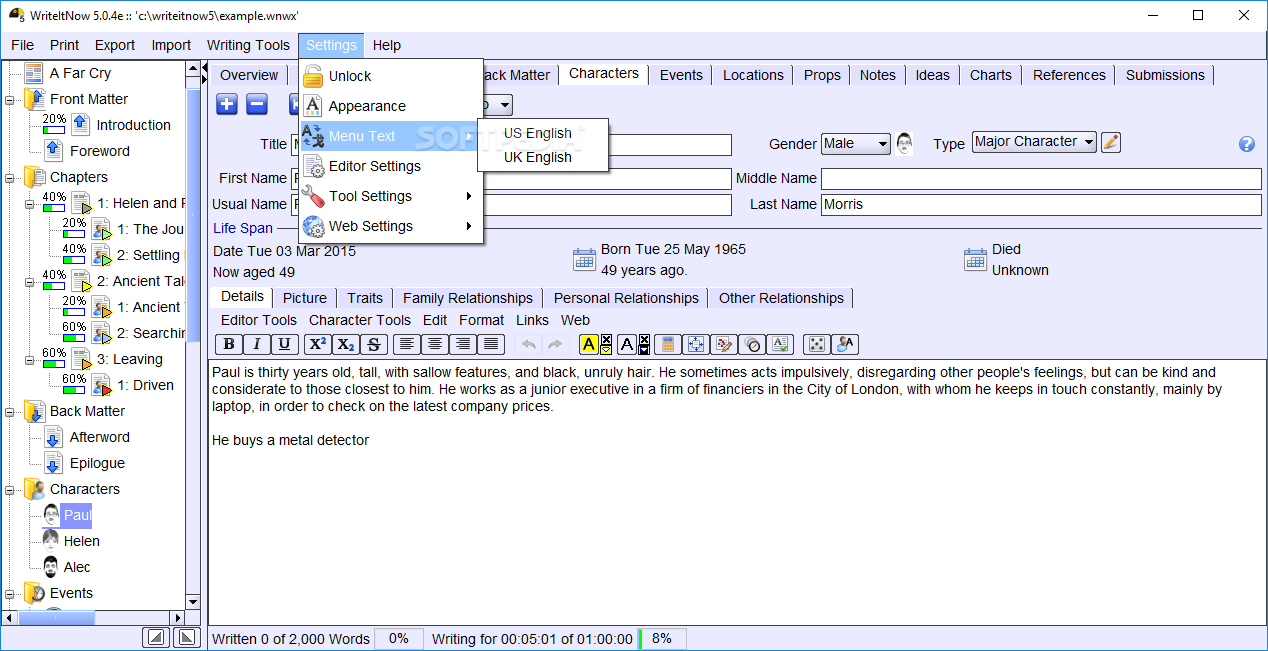YWriter, a free Spacejock program (available at ) is the quintessential organizer for writers. It allows you to see yo. Download yWriter for Windows now from Softonic: 100% safe and virus free. More than 205 downloads this month. Download yWriter latest version 2021. YWriter 心の作家とその名が示すとおり、開発されているアプリケーションです。その小説、短編小説や台本を書くことは容易では、いくつかの特別な機能を含むテキスト プロセッサです。ちょっと複雑に存在する要素の膨大な量の主因は本を書く: 文字、シーン、場所およびオブジェクト。. YWriter has a comprehensive backup system, but when things go wrong it's handy to have step by step instructions for recovering your data. Important: If your project files don't have.yw5 extensions, you need to change the Windows folder settings to enable this option: Display File.
There are dozens of tools out there that are designed to help make the writing process easier, a lot of which are targeted towards non-linear writing. Today, I’d like to dive into yWriter and Scrivener, both of which are exceptional tools in this space. Both tools allow building of scenes and being able to arrange them on the fly or tag them. You can also track your word counts and progress in both tools, but they have a few differences. If you just want a raw comparison, here you go:
| Feature | Winner |
| User Interface/Experience | Scrivener, hands down – Drag & Drop functionality, color, and fewer bugs |
| Metrics (Word Count, WPM, novel length) | yWriter, very narrowly – Same metrics, yWRiter makes them more visible. |
| Non-linear Writing Capabilities | Scrivener – You have a lot more power to structure things however you like, nesting documents and folders |
| Backups and Restores | Equal – Both possess good backup functionality. |
| Writer’s Tools (tagging, metadata, labeling, etc) | Equal – Scrivener has a LOT of flexibility here with custom metadata, page and project notes, POV, status fields, etc… But maybe it’s too much. yWriter has clearly labeled sections for Locations/Characters/Items, and lets you follow some very explicit (hardcoded) attributes for those items. This ends up being personal preference. |
| Analytics | yWriter – Although Scrivener can give you counts of the words you use so you can see if T”Throttle” is just coming up way too much, yWriter gives you the ability to see how many scenes features which characters or locations, how often a characters serves as a POV, and more. |
| Price | yWriter – Can’t beat free. |
That is the broad overview of the comparisons, but feel free to read on for the deep dive on each.
Scrivener Overview
Scrivener, made by Literature and Latte (https://www.literatureandlatte.com/scrivener.php) is a fantastic tool that I’ve mentioned a few times on this blog already. It is highly evolved and targeted initially towards Mac users (although they do make it available to Windows users as well).
- Everything works from a single text “unit” that can be labeled as a scene, a character bio, a location, or anything else. This creates a lot of flexibility. Do you need to track magic spells available for whatever reason? Just start labeling the documents that way and add icons.
- The arrangement of scenes (or “texts”) is very intuitive and easy, built on a folder structure (which, incidentally can also contain writing). It’s very drag-and-drop friendly to arrange your scenes both from an order perspective as well as a hierarchical perspective. You also can add color coding to an outline view to give yourself detailed looks at content.
- The cork-board view expands the concept of moving things around and arranging them where you like them. It really lets you get the feel of organizing notecards (which can also be color-coded and labeled) to decide where you want. Even aside from that, you can view your scenes in a single browser, compare scenes to each other in the same windows, and get lots of ways of looking at the data.
- Keywords and Metadata attributes can be assigned to each scene (document). For instance, you could create a metadata field entitled “Location.” On each scene, you’d have the ability to type in the location and populate. Likewise, you could create a list of characters using keywords (with each new character having its own keyword). You then could assign a color-coded character to your scenes to make life fast and easy when scanning scenes to see who is in it.
You can get Scrivener for $40 USD, but if you time your purchase around one of the Nanowrimo events, you can pick a copy up with a discount, making it a great buy.
yWriter
yWriter by Spacejock software (http://www.spacejock.com/yWriter5.html) is another great tool, and also has the added benefit of being completely free. A few of its highlights:
- While it lacks some of the flexibility and customization on its units as Scrivener, it has hardcoded several elements including Scenes, Characters, Locations and Items. These have their own properties and unique traits. This lets you add a lot of meta-information about them that are unique to that type of thing. Beyond that, you can see how these things relate to one another, and perform detailed analytics on those relationships. IE: Pick a character and see how many scenes that character appears in… How many scenes that character is the POV character for (which is just another thing that is hardcoded and thus can be reported on).
- If you’ve ever read Dwight V Swain’s book Techniques of the Selling Writer, you’ve seen how he breaks apart scene structure as Action/Reaction and goals. This helps make sure that your scenes are actually bringing content to your story. Yes, I recognize that it is oversimplifying things, but it’s a great tool to use. A great reference book to read as well if you haven’t (heavy read though!).
- Reporting and metrics are better. You can see in a quick window your word count per scene/chapter/section/etc. You can see your words per minute while typing. Everything is tracked and highly visible. Is this necessary? It’s a personal preference, but I know I like to see if I can keep my WPM up on a first draft to ensure that I am getting some writing done. By the same token, you also can track (and graph) attributes you’ve defined based on each scene, such as comedy, intensity, villain redemption, etc. Coupled with the graph, you can make sure your peaks and valleys are where you’d expect them.
All in all, both are great tools and worth looking at. Which do you prefer? Something else all together?

A complex and handy software utility that organizes your novel into chapters and scenes allowing you to efficiently schedule your work
What's new in yWriter 6.6.2.0 Beta:
- BETA new tabbed dialog control.
Writing can be a time-consuming passion and the twists and turns of any plot line can be hard to follow especially when ideas keep coming to you. yWriter is an interesting app that helps you treat any novel as a project, by breaking it into chapters and scenes.
The program has a clean interface that’s extremely easy to work with. Basically, the app helps you organize thoughts and ideas, key scenes and “put meat” on the characters.
New projects can be created from scratch or with the help of a step-by-step wizard.
The program can create an undefined number of chapters. Descriptions can be added to these in order to have a better view of all the important points in the story. Each chapter contains multiple scenes that can be moved around whenever you want.
The scenes contain the story itself, but the plot can further be sketched by adding a viewpoint, additional details, choosing the characters that take part of the scene and the location, as well as including notes and pictures.
Each character can be shaped with the help of a brief form. Aside from the short and full name, you can assign it a minor or major role. A description and a short biography can also be provided, as well as a reference picture, goals and notes.
A storyboard view is also available; this can help you get a better picture of the state of the story. As you add more scenes, chapters and characters, the board grows and you see the bigger picture.
yWriter comes with a few progress trackers, enabling you to see exactly how many words are written in a scene and how many scenes are included in a chapter.
All in all, yWriter is a great tool that can be extremely useful. Inexperienced users should be able to quickly figure out how to work with this app.
Filed under
Download Hubs

yWriter is part of these download collections: Novel Writing Tools
yWriter was reviewed by Gabriela Vatu
Gabriela VatuYwriter 7
yWriter 6.6.1.9 / 6.6.2.0 Beta
add to watchlistsend us an updateYwriter Free
- portable version
- A portable version of this application is available: yWriter Portable
- runs on:
- Windows 10 32/64 bit
Windows 8 32/64 bit
Windows 7 32/64 bit
Windows Vista 32/64 bit - file size:
- 7.4 MB
- filename:
- yWriter6Full.exe
- main category:
- Authoring Tools
- developer:
- visit homepage

Ywriter Ios
top alternatives FREE
top alternatives PAID
